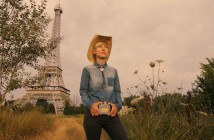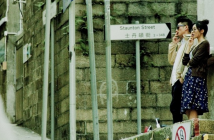They enter the cinema and become ghosts. Or maybe they have already been ghosts for decades, maybe they are bored souls caught in perpetual repetition. Like the characters projected on the screen, these moviegoers are shadows performing scripted orders, dead bodies reacting to a foreign will.
Whatever their past, each moviegoer enters the cinema as a blank slate. For two hours, they all agree to become architecture, decorative pillars for the wrecked film palace. Almost none of them engage in conversation with other moviegoers or reveal the content of their lives. They would rather wander aimlessly around the neglected halls, losing themselves to the dark.
In a quietly funny scene, a man paces down an overloaded storage room of sorts. During this nocturnal expedition, he runs into several fellow wanderers, all of them as restless as himself, and even those who stand idly are not relaxed but seem poised with anticipation. As if this cinema were meant for transit, like a long runway stretching across distant points, each end lost in the remote haze. We feel none of the characters remember or care where they came from. And they most assuredly cannot guess where they are going.
Maybe the cinema has captured them, ensnared an afterimage of their bodies. The epiphanies and joys of watching a movie produce tiny explosions and microscopic revolutions, and maybe these explosions and revolutions leave behind a residue, a fragment of the wounded moviegoer, and this fragment can do nothing else with its days but wander the cinema like a stranded memory.
We laugh at the neurotic young man with a phobia for other people. In a ridiculous bathroom episode, he becomes embarrassingly surrounded by men as he fails to make quick work of his obligations at the urinal. We cry for the ticket booth lady. Despite her limp, she undertakes a solitary journey around the film palace during its last picture show. In one scene, she emerges from behind the movie screen. The projected shadows are reflected on her face and a silent conversation is established between her and the protagonist of the film-within-the-film. After the projector stops rolling and the audience exits the theater, she walks past the empty stalls for the last time. It is a very long take. The rows of seats accrue weight and power, the gravity of final words.
Here, the relationship between character and environment is not a confrontation. This is not the story of fragile humans harassed by an oppressive environment. Rather, character and environment melt into an amorphous mass, and there is finally only one gigantic character, the cinema with all its little human figures. These elements, the space of the cinema and the dance of the human figures, combine to orchestrate the meaning of the film and nourish its poetic currents. Solitude, yearning, nostalgia, and oblivion play at the sandbox of this dilapidated cinema, a ruined landscape populated by ghosts. Unable to suggest anything other than its own decline, the cinema forces its last moviegoers to describe a funeral dirge in the mute music of their aimless walking.
And if these moviegoers are the fragmentary remnants of former patrons, then they will also vanish along with the cinema, and the collected memories of the film palace, its projected wonders, and the passions that erupted in public and private ways within its walls, will likewise fade into rumor. These nameless moviegoers, in some unplaceable yesterday, came from and returned to unknown lives, but during their brief stay they left behind holograms of their bodies. Now these too will disappear.
[notification type=”star”]85/100 - Here, the relationship between character and environment is not a confrontation. This is not the story of fragile humans harassed by an oppressive environment. Rather, character and environment melt into an amorphous mass, and there is finally only one gigantic character, the cinema with all its little human figures.[/notification]




